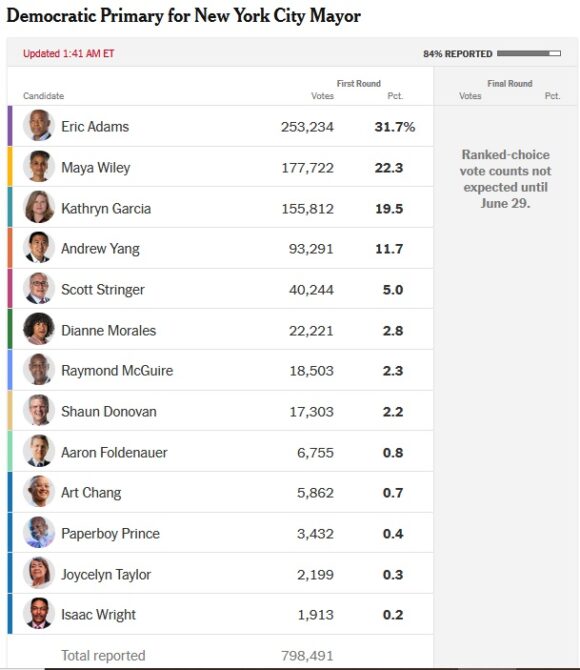Dear Commons Community,
With 82 percent of the results in, Eric Adams, the Brooklyn borough president, was the first choice of 31.7 percent of those who voted in person yesterday or during the early voting period, as New Yorkers chose a leader to steer the city’s reopening and economic recovery. The winner of the Democratic primary is likely to win the general election in November.
The initial outcome capped an intense campaign defined by debates over public safety and the economy, political experience and personal ethics, as the candidates presented sharply divergent visions for how they would lead New York into its post-pandemic future.
Maya Wiley, a former counsel to Mayor Bill de Blasio, was in second with 22.3 percent; Kathryn Garcia, a former sanitation commissioner, was in third with 19.5 percent. Either would become the city’s first female mayor.
Andrew Yang, the former presidential candidate, was a distant fourth, and was the first candidate to concede on Tuesday night, a striking development after he had spent months as the dominant candidate in the race. As reported by The New York Times.
“We still believe we can help, but not as mayor and first lady,” said Mr. Yang, who had hoped to be the city’s first Asian American mayor, as he stood with his wife, Evelyn.
Mr. Adams led in every borough except Manhattan, where Ms. Garcia held a commanding edge. But because Mr. Adams seemed unlikely to earn more than 50 percent of the vote, the contest will be decided under New York’s new ranked-choice voting system.
New Yorkers could rank up to five candidates in order of preference, and absentee ballots must also be counted. It may take until mid-July before a Democratic primary victor — who would become an overwhelming favorite to win the general election in November — is officially declared.
“Tonight we took a huge step forward,” Mr. Adams said as he called for unity. “As a city we’re going to turn our pain into purpose. We’re going to become a safe, affordable, fair city.”
New Yorkers on Tuesday also rendered judgments on other vital positions in primary races that will test the power of the left in the nation’s largest city. The city comptroller’s race, the Manhattan district attorney’s race and a slew of City Council primaries, among other contests, will offer imperfect but important windows into Democratic attitudes and engagement levels as the nation emerges from the pandemic in the post-Trump era.
But no race was being more carefully watched than the contest to succeed Mayor Bill de Blasio, an election that began in a shuttered metropolis in the midst of the pandemic, and ended as the city reopened but confronted a spate of new challenges.
The mayoral hopefuls spent the last hours of the primary making nonstop appearances across the city, casting the stakes of the contest in sweeping terms and promoting sharply divergent visions for how they would lead New York forward.
The race remained fluid and strikingly contentious as polls closed. It was not until the end that the candidates appeared to put serious effort into ranked-choice strategizing, as Mr. Yang and Ms. Garcia struck up an alliance during the final weekend of the primary.
According to the city’s Board of Elections, more than 191,000 New Yorkers came to the polls during the early voting period, and the board received about 220,000 requests for absentee ballots. On Tuesday, as an afternoon rain set in, many polling places were relatively quiet, and it was difficult to predict what the composition of a post-pandemic electorate looked like, and whom it would benefit.
The winner of the Democratic nomination will face Curtis Sliwa, the founder of the Guardian Angels, who handily defeated Fernando Mateo, a restaurateur, in the Republican primary. The Associated Press declared Mr. Sliwa the winner last night.
Shaun Donovan, a former federal housing secretary; Raymond J. McGuire, a former Citi executive; and Scott M. Stringer, the city comptroller, who all benefited from heavy spending on television on their behalf, had hoped to show unexpected strength through the ranking process, but may be too far behind after the initial count.
Dianne Morales, a former nonprofit executive, once appeared poised to be a left-wing standard-bearer, but her standing suffered amid internal campaign turmoil, and she also trailed far behind.
No issue dominated the race more than public safety, as poll after poll showed combating crime was the most important issue to New York Democrats.
Sparse public polling suggested that Mr. Adams, a former police captain who challenged misconduct from within the system — part of a complex career — attained credibility on that subject in the eyes of some voters, which will have been a crucial factor if he wins, along with significant support from labor unions and deep ties to core Democratic constituencies, including working- and middle-class voters of color.
“I am going to be your mayor,” Mr. Adams said. “I want you to believe again. Let’s bring our city back.”
The final count of yesterday’s election might not be available for several weeks.
Tony



